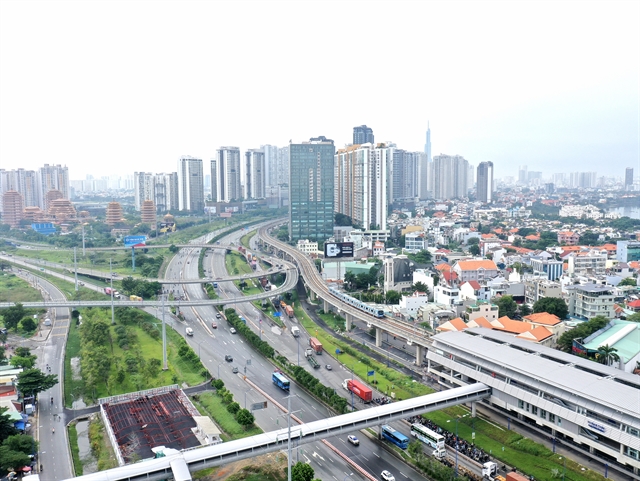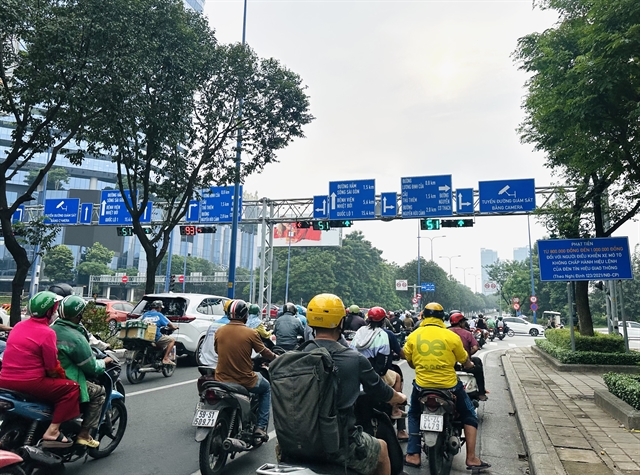 Opinion
Opinion

Nguyễn Diệp
 |
| A section of HCM City’s Metro Line No 1. The city is developing an intelligent transportation system to mitigate traffic congestion and ensure traffic safety. — VNS Photo Nguyễn Diệp |
HCM CITY — In the context of rapid urbanisation, and a science and technology revolution in many fields, the combination of technology and management is the key to improve the quality of the urban transport system towards a modern, sustainable and smart city.
Võ Khánh Hưng, deputy director of the city’s Department of Transport, said the city is focusing on developing an intelligent transportation system, a global trend for all cities, in order to mitigate traffic congestion and ensure traffic safety.
Recently, the city has focused on promoting the application of science and technology in handling traffic violations, bringing positive results.
In the first six months of this year, the inspectorate of the city's Transport Department detected and handled more than 1,700 traffic violations with total fines of more than VNĐ23 billion (over US$903,000).
In particular, the pilot programme of using automatic weighing stations has allowed violations to be handled even when the vehicle is no longer at the scene, with 762 violations totalling fines of more than VNĐ16.9 billion ($663,600).
The number of vehicles violating the weight limits reduced remarkably by 91 per cent after the six-month trial use of automatic weighing machines.
The image-based penalty system also contributed to detecting and handling 537 cases of passenger transport violations, with a total fines of more than VNĐ675 million ($26,500).
“These results confirm the important role of technology in improving the efficiency of traffic management and handling violations,” he said.
The city’s Police is using software to handle administrative violations and manage traffic accident data, effectively supporting the pursuit and search of stolen vehicles.
Meanwhile, the city’s Department of Transport has also implemented the digital transformation programme and a project to build the city into a smart city in the transport sector by 2024, by focusing on applying artificial intelligence (AI) and developing an integrated system, using data analysis to improve the efficiency of traffic management and operation.
The city has about 1,000 cameras monitoring the traffic light system. Of which, more than 200 cameras have automatic control capabilities, helping to ensure smooth and efficient traffic.
Võ Khánh Hưng said the city focuses on monitoring traffic through a camera system, traffic regulation through traffic light systems, and handling traffic violations through images from surveillance cameras.
“This requires technology applications and monitoring units to process and flexibly adjust to enhance and optimise the efficiency of traffic management and operation,” he said.
For example, sometimes it needs to adjust traffic signal light timing to make traffic flow smoother, he said.
Associate Professor Vũ Anh Tuấn, director of the Vietnamese-Germany Transportation Research Centre, said a smarter and interoperable transport system is a sustainable direction that allows for a more effective management of traffic and mobility across transport modes, contributing to cleaner air.
“The development of electronic vehicles will help reduce air pollution from traffic, and improve traffic safety and order,” he said.
However, this process still has many challenges in terms of planning, policy, and the technical capacity of the engineering team, he said.
“It requires the whole society to join hands in developing an intelligent and sustainable transportation system,” he said.
 |
| Mai Chí Thọ Street in HCM City’s Thủ Đức city has installed cameras for traffic monitoring. — VNS Photo Nguyễn Diệp |
Traffic management technology solutions have also developed alongside the development of smart vehicles, meeting the specific needs of cities towards more connected and sustainable transport ecosystems.
The use of advanced technologies, such as edge computing (EC), artificial intelligence (AI), internet of things (IoT), 4G and 5G, in building a smart transportation system is an inevitable trend, Trần Kiên, deputy general director of Advantech Việt Nam Technology, said.
Among the technologies, AI applications now have the ability to recognise faces, license plates, public transport, as well as identify objects on the road from an image or video, he said.
“AI also supports data analysis to help operators make appropriate decisions, minimise risks and optimise time, and Key Performance Indicators (KPIs) in smart traffic management,” he said.
Along with investing in building traffic infrastructure, the city has implemented projects to apply information technology in traffic management, Võ Khánh Hưng said.
A typical example is the Urban Traffic Management Centre in Thủ Đức city, which has brought initial results, he said.
The city also invested in an intelligent traffic management system (ITS), GIS applications to manage infrastructure data, and AI to adjust traffic lights.
It is also developing smart public transport with electric buses and metro lines, and cooperates with universities to train high-quality human resources.
Bùi Xuân Cường, vice chairman of the municipal People's Committee, said although the city has achieved many positive results, it still faces many difficulties, especially in integrating technology systems and traffic data.
“Creating a shared database is a big challenge, requiring close coordination between relevant agencies,” he said.
The city always promotes the application of science and technology in traffic management, operation, patrolling and controlling, and handling violations of traffic law.
It has approved investment in cameras, and the renovation and upgrading of traffic signal control buttons, along with a number of directives related to data systems and journey monitoring equipment to serve transport management.
The city’s first metro line is set to begin commercial operation in December, and is part of the city’s effort to develop an intelligent transportation system.
In the coming time, the city will continue to invest and improve its transportation system to ensure the quality of life for local people and maintain its position as the country’s major socio-economic and cultural centre. — VNS




